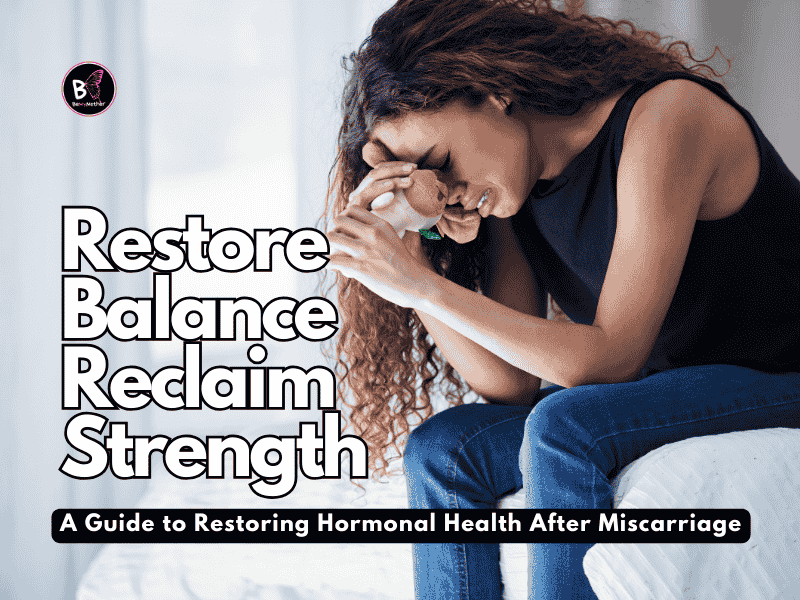The heartbreak of miscarriage is something no one wants to endure. Along with emotional pain, the physical toll it takes on your body—especially your hormones—can feel overwhelming. How to regulate hormones after miscarriage is one of the first questions many women ask as they navigate their recovery.
Hormones like estrogen, progesterone, and hCG, which surged during pregnancy, begin to drop rapidly after a miscarriage. This sudden hormonal crash can cause mood swings, fatigue, irregular periods, and more. The good news? Your body can heal, and with the proper guidance, you can support this process.
Let’s explore actionable strategies for balancing hormones, regaining strength, and finding emotional peace, all supported by expert-backed advice.
1. Understanding Hormonal Changes After a Miscarriage
Hormonal shifts are a natural part of recovery after pregnancy loss. Key pregnancy hormones like:
- hCG (human chorionic gonadotropin): Drops immediately following miscarriage.
- Progesterone: Decreases, potentially leading to symptoms like fatigue or mood changes.
- Estrogen: Declines, affecting energy levels and emotional well-being.
These hormonal changes are temporary, but their effects can linger. Your body will need time to recalibrate, typically within 4 to 6 weeks, though this varies by individual.
2. How Long Does It Take for Hormones to Regulate After a Miscarriage?
The timeline for hormonal balance depends on factors such as:
- The stage of pregnancy at the time of miscarriage.
- Your body’s natural recovery rate.
- Underlying health conditions like PCOS or thyroid issues.
For most women, hormones return to baseline levels within a month or two. However, if you experience persistent symptoms, consult a healthcare provider to rule out complications.
3. Signs of Hormone Imbalance After Miscarriage
Recognizing the signs of hormone imbalance is the first step toward effective treatment. Common symptoms include:
- Mood Swings: Increased irritability or sadness.
- Irregular Periods: Delayed or unusually heavy periods.
- Fatigue: Persistent tiredness even after rest.
- Insomnia: Difficulty falling or staying asleep.
A medical evaluation may be necessary if these symptoms persist beyond eight weeks.
4. How to Regulate Hormones After Miscarriage Naturally

Natural methods can help your body regain hormonal balance:
- Balanced Nutrition:
- Include foods rich in omega-3 fatty acids (salmon, walnuts), fiber (leafy greens), and antioxidants (berries).
- Avoid processed foods and refined sugars that can disrupt hormonal balance.
- Herbal Support:
- Studies published in the Journal of Ethnopharmacology have shown that herbs like ashwagandha and maca root support hormonal health.
- Hydration and Rest:
- Drink at least eight glasses of water daily and aim for 7–9 hours of sleep.
- Stress Management:
- Practices like yoga, meditation, or journaling can lower cortisol levels, helping other hormones stabilize.
Tracking ovulation is key to understanding your cycle after miscarriage. Discover how Can Inito Detect Pregnancy? can guide you through recovery.
5. What to Eat and What to Avoid After a Miscarriage
Your diet plays a critical role in hormone recovery.
Foods to Prioritize
| Nutrient | Food Sources | Benefits |
| Omega-3 Fatty Acids | Salmon, chia seeds, walnuts | Reduces inflammation and supports mood. |
| Vitamin B6 | Bananas, spinach, poultry | Regulates progesterone levels. |
| Iron | Lean meat, lentils, tofu | Restores blood levels after loss. |
Foods to Avoid
- Caffeine: Exacerbates anxiety and disrupts sleep.
- Alcohol: Slows hormonal recovery.
- Processed Foods Contain chemicals that interfere with hormonal regulation.
6. Periods After Pregnancy Loss: What to Expect
Your first period after a miscarriage may be different. Here’s what to watch for:
- Timing: Most women get their period within 4–6 weeks.
- Flow: Heavier or lighter than usual is normal but should be regulated by the second cycle.
- Symptoms: Cramping may feel more intense due to uterine recovery.
If your period doesn’t return after 8 weeks or is unusually painful, seek medical advice.
Managing cycles with PCOS? Learn how to reduce risks and improve hormonal health with our guide on How to Avoid a Miscarriage with PCOS.
How to Regulate Hormones After Miscarriage – Getting pregnant after miscarriage – How long should you wait?
7. What Not to Do After a Miscarriage
Avoiding certain activities can protect your physical and emotional recovery:
- Overexertion: Take it slow with physical activities exceptionally high-impact exercises.
- Neglecting Emotional Health: Bottling up grief can prolong recovery.
- Drastic Dieting: Focus on nourishment, not restriction, to support healing.
8. Emotional Recovery and Staying Positive After a Miscarriage
Healing emotionally after a miscarriage is as substantial as physical recovery. Here are some tips:
- Talk About It: Share your feelings with trusted loved ones or a therapist.
- Join Support Groups: Connecting with others who’ve experienced loss can be comforting.
- Celebrate Small Wins: Focus on progress, whether getting better sleep or feeling more energized.
9. Exercise and Hormonal Balance: How Movement Can Help
Gentle exercise can significantly aid hormone regulation by:
- Lowering stress hormones like cortisol.
- Boosting endorphins improves mood.
- Enhancing circulation, which supports organ recovery.
Recommended Activities
| Type | Examples |
| Low-Impact Cardio | Walking, swimming. |
| Strength Training | Light weights, bodyweight exercises. |
| Mindful Movement | Yoga, tai chi. |
Avoid high-intensity workouts until cleared by your doctor.
FAQ: Common Questions About Regulating Hormones After Miscarriage
1. How long should I wait before trying to conceive again after a miscarriage?
Most doctors recommend waiting until at least one complete menstrual cycle to allow your body to recover, though timelines vary.
2. Can I speed up hormonal recovery after a miscarriage?
While you can’t rush the process, maintaining a healthy diet, managing stress, and staying active can support faster recovery.
3. Is it normal to have irregular periods after a miscarriage?
Yes, it’s common for cycles to be irregular for a few months. If irregularities persist, consult your healthcare provider.
4. What are the signs that my hormones are returning to normal?
Regular periods, improved mood, and reduced fatigue are key indicators of hormonal balance.
5. Do I need medical treatment to regulate hormones after a miscarriage?
Not always. Most women recover naturally, but medical intervention may be needed if symptoms persist or complications arise.
Conclusion
Recovering from a miscarriage is a deeply personal journey that involves physical, hormonal, and emotional healing. While it takes time, understanding how to regulate hormones after miscarriage empowers you to take control of your recovery.
Proper nutrition, stress management, and medical guidance can help your body regain balance. Remember, you’re not alone—there’s a professional and personal network of support to help you through.



